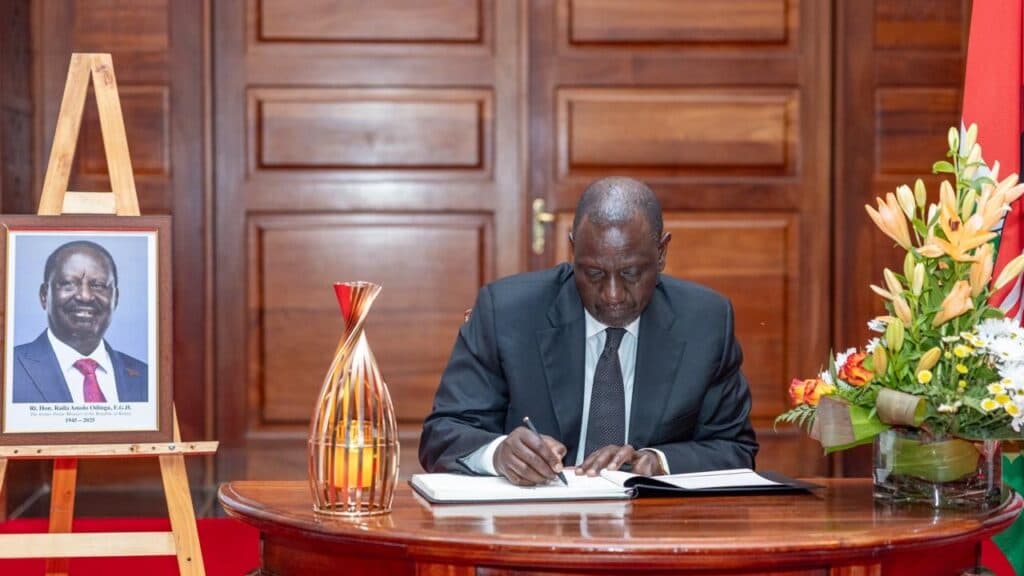We're loading the full news article for you. This includes the article content, images, author information, and related articles.
President William Ruto asserts his actions were a constitutional duty, sparking a national debate on political sensitivity and legislative timing amid widespread mourning for former Prime Minister Raila Odinga.

NAIROBI, KENYA – President William Ruto on Thursday, October 23, 2025, defended his decision to sign eight contentious bills into law on the same day the nation learned of the passing of former Prime Minister Raila Odinga, stating it was his constitutional duty. The move, which occurred on Wednesday, October 15, 2025, has ignited a fierce debate across Kenya, with critics questioning the timing and sensitivity of the legislative action during a period of national mourning.
Speaking in Laikipia County, President Ruto explained that the assent to the bills was a pre-scheduled part of his official duties for the day and that he learned of Mr. Odinga's death after arriving at his office. “I woke up on Wednesday, and the signing was my work for the day—it is a constitutional mandate,” President Ruto stated. “I was to sign because the Bill had passed all stages and had been brought to me by the Speaker. But by bad luck, we lost one of our leaders.”
The former Prime Minister, a towering figure in Kenyan politics for decades, passed away at the age of 80 after suffering a cardiac arrest during a morning walk in Kerala, India, where he was receiving medical treatment, according to hospital officials. His death on October 15, 2025, sent the nation into a period of mourning, with President Ruto declaring seven days of national mourning and a state funeral.
The eight pieces of legislation assented to at State House, Nairobi, cover significant reforms in land, security, technology, and the economy. They include the Computer Misuse and Cybercrimes (Amendment) Act, 2024; the Privatisation Act, 2025; the Land (Amendment) Act, 2024; the National Land Commission (Amendment) Act, 2023; the Wildlife Conservation and Management (Amendment) Act, 2023; the National Police Service Commission (Amendment) Act, 2024; the Air Passenger Service Charge (Amendment) Act, 2025; and the Virtual Asset Service Providers Act, 2025.
The timing of the signing drew immediate and sharp criticism. Former Chief Justice David Maraga described the act as “insensitive and symbolic of the administration's contempt for the people's will,” arguing that some of the new laws, particularly the cybercrime amendments, were designed to suppress dissent. Governance expert Ahmed Hashi echoed these sentiments, stating, “Ruto stated that we should stop what we were doing to mourn the greatest leader of our time. But he assembled to sign the most draconian law of our time.”
The Computer Misuse and Cybercrimes (Amendment) Act has been the most contentious, with critics fearing it grants the government sweeping powers to shut down websites and silence online expression without adequate judicial oversight. Following a petition by gospel singer Reuben Kigame and the Kenya Human Rights Commission, the High Court on October 22, 2025, suspended the implementation of two sections of the controversial law pending a hearing.
Further controversy arose from Kiambu Senator Karungo Thang'wa, who on October 22, 2025, accused the President of violating the Constitution by signing seven of the eight bills without them being presented to the Senate, which he argued was necessary as they touched on county functions.
The government has defended the substance of the new acts as essential for national development and security. An analysis of the key laws reveals their potential impact:
While the President and his allies, including Government Spokesperson Isaac Mwaura, maintain that the legislative process was procedural and necessary for the continuity of government business, the controversy has cast a shadow over the national mourning period. Mwaura stated on October 23, 2025, that the presentation of the bills was pre-arranged to comply with strict constitutional timelines and international commitments.
During the mourning period, the Odinga family and the ODM party focused on funeral arrangements and celebrating the life of the late statesman. In public statements, family members like Oburu Oginga and Winnie Odinga thanked President Ruto for his support during their bereavement, without directly addressing the controversy over the bills. The broader opposition, however, voiced its discontent, with one unnamed opposition senator stating, “A time of mourning should not be a time for backdoor policymaking.” The debate highlights a deep-seated tension in Kenyan politics between procedural governance and public sentiment, particularly in a moment of collective loss for a leader who many, including his critics, saw as a central figure in the nation's democratic struggle. As legal challenges against the new laws proceed, the full impact of the legislation signed on that fateful Wednesday remains a subject of intense national scrutiny.
Keep the conversation in one place—threads here stay linked to the story and in the forums.
Sign in to start a discussion
Start a conversation about this story and keep it linked here.
Other hot threads
E-sports and Gaming Community in Kenya
Active 9 months ago
The Role of Technology in Modern Agriculture (AgriTech)
Active 9 months ago
Popular Recreational Activities Across Counties
Active 9 months ago
Investing in Youth Sports Development Programs
Active 9 months ago
Key figures and persons of interest featured in this article